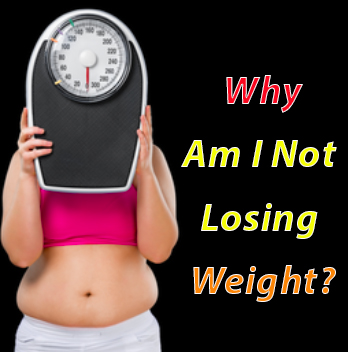
Why Am I Not Losing Weight?
Weight loss often results from eating a balanced diet and exercising regularly. Still, you may wonder, “Why am I not losing weight?” Not experiencing weight loss could be due to several factors, such as the medications you are taking, the way you are exercising, or your eating patterns.
You might not notice weight loss or your desired results even when you do everything “right.” Read on to learn why you might not be losing weight.
1. Doing Too Much Cardio
Cardio is a necessary part of your workout routine, as it helps keep your heart healthy. Aerobic exercise keeps your heart strong, helps prevent diabetes, Alzheimer’s, and several cancers, improves sleep, and lessens stress.1 Still, if you are doing too much cardio and not eating enough, you may lower your metabolism because your body thinks it needs to conserve energy. The American Heart Association recommends you get 150 minutes (2.5 hours) of moderate aerobic exercise per week or 75 minutes of vigorous aerobic exercise per week
2. Not Weightlifting
Do other exercises besides cardio if you are working out but not losing weight and your primary goal is fat loss. You can lose weight and build lean muscle by doing strength training in addition to your cardio. Muscles allow for more calorie burn. Try adding interval training, which involves short bursts of all-out effort mixed into your regular session. These workouts are effective at decreasing abdominal and visceral fat.5 Then, start adding some resistance training to your routine.
3. Not Doing Post-Workout Recovery
Recovery and rest are often more important than the workout itself. Getting enough recovery time allows you to prepare for the next workout you do. Not resting can result in worse performance later. Focus on different muscle groups on different days. For example, you can do a lower-body workout on a Monday and an upper-body workout the next day. Or, establish a workout routine where you work your entire body one day. Then, take the next day to do light cardio, stretching, or rest.
4. Sitting Too Much
Sitting for long periods may be the reason for weight gain or a lack of weight loss. Research has found that your risk for obesity increases by 5% for every two hours of sitting.
Experts advise that adults be physically active for:
- Up to 300 minutes weekly for moderately-intense exercise
- Up to 150 minutes weekly for vigorously-intense exercise
- At least 60 minutes weekly minimum if you are new to exercise
What matters most is moving. Just engaging in the habit of being active can benefit your general health if standing up is inaccessible.8 You can also take “movement breaks” throughout the day, which can look like taking the stairs if accessible, parking farther away from your destination, and making extra trips to refill your water bottle.
5. Not Balancing Food With Activity
Some people focus all their energy on burning off calories and may not take the time to consider what they are putting in as fuel. You can gain weight instead of losing it if you consume more calories than you burn.
Ensure you eat enough calories to manage your weight while being physically active. The amount of calories will differ based on your age, height, and activity level. Aim for a balanced diet that includes the following:10
- Fruits and vegetables
- Limited added sugars, sodium, saturated fats, trans fats, and cholesterol
- Various protein sources, from nuts and seeds to seafood and eggs
- Whole grains
6. Limiting Macronutrients Too Much
Cutting out an entire macronutrient from your daily diet—like carbs, the body’s primary energy source—can deprive your body and tempt you to binge. Instead, consider the following for macronutrients:
- Add healthy fats to your eating plan: Foods with healthy fats, or unsaturated fats, include chia seeds, hemp seeds, and fatty fish like salmon or sardines.
- Choose lean or plant-based proteins: These include lean pork loin, chicken, turkey, beans, and lentils.
- Reach for healthy, complex carbs: Sweet potatoes, oats, and quinoa are a few complex-carb choices. Limit simple carbs, like candy, soda, sugary sweets, and processed foods with added sugar.
7. Eating Too Much or Not Enough
Overeating can hinder weight loss. Your body needs to run a calorie deficit to lose weight, meaning you need to burn more calories than you consume.9 Keep in mind that you do not need to limit yourself too much, either. Not eating enough can lead to an increased appetite and weight regain later. It can also reduce your metabolism. Instead, try to eat whenever you are hungry. Eat slowly enough so you can stop just before you get full. Do not be afraid to eat the foods you enjoy from time to time in a healthy amount. Make small goals for eating well, like adding one vegetable to each meal, to make this more manageable. This is all easier said than done. Talk to a healthcare provider or registered dietician for support.
8. Not Drinking Enough Water
Keep yourself hydrated with water, whether you are active or not.
Water also has several health benefits beyond helping you manage your weight, including:15
- Cushioning and lubricating your joints
- Helping your body get rid of wastes
- Preventing dehydration
- Regulating your body temperature
9. Not Getting Adequate Sleep
Most adults generally need seven to nine hours of sleep every night.16 Not getting enough consistent sleep consistently can lead to weight gain. Research has linked sleep deprivation, or a loss of sleep, to both obesity and an increased risk of future weight gain.17 That’s because the same hormones—namely ghrelin and leptin—that play a role in the sleep cycle also affect your appetite. Ghrelin is a hunger hormone, and leptin is a satiety hormone that controls how full you feel. Ghrelin levels can increase, and leptin levels can decrease when your sleep pattern is off-balance. Those changes tend to result in more hunger and less fullness.
10. Experiencing Too Much Stress
Excess cortisol, a stress hormone, is involved in processes that give your muscles the energy to move. Cortisol also causes negative effects, like fat that takes a while to lose, if you are exposed to it for long periods. Your body may produce excess cortisol if:
- You experience great stress or anxiety in your personal or work life
- You are not taking enough rest days or you’re working out too intensely
- You are not getting enough quality sleep
“Stress less” is often unhelpful advice, but if you think stress it to blame for your weight, consider where in your life you can start to alleviate it. If your stress or anxiety feels out of control, talk to a mental health professional.
11. Taking Medications That Cause Weight Gain
You might not be able to lose weight as efficiently as you want to if you are taking certain medications. Examples include beta-blockers, corticosteroids, and insulin.
Weight gain is a common side effect of other medications, including:
- Antidepressants: Selective serotonin reuptake inhibitors (SSRIs) and serotonin-norepinephrine reuptake inhibitors (SNRIs)
- Anti-diabetics: Rosiglitazone
- Anti-epileptics: Valproate
- Antipsychotics: Clozapine, olanzapine, and risperidone
Do not start or stop a medication without talking to your healthcare provider. Talk to a medical professional if you suspect your prescriptions are affecting your weight.
12. Having a Health Condition That Affects Your Weight
Certain health conditions may hinder weight loss. Examples include:
- Cushing syndrome, a hormonal disorder that develops after long-term exposure to high levels of cortisol23
- Depression
- Diabetes
- Hypogonadism, which occurs if your gonads (sex glands) make little or no hormones24
- Hypothyroidism, or an underactive thyroid (the butterfly-shaped gland in your neck)25
- Menopause
- Polycystic ovary syndrome (PCOS), which happens if the ovaries or adrenal glands produce more androgens (male hormones) than usual26
13. Experiencing a Weight Plateau
Sometimes, you exercise regularly and eat healthily, but the scale numbers do not change. Your weight loss might have plateaued, which can happen for many reasons. For example, a decrease in calorie consumption can result in an initial rapid drop in weight as your body burns stored glycogen (sugar) for energy. You might even lose a little muscle along with fat. You may need to change your calorie intake or amp up your physical activity to lose weight.
Weight is not always the most accurate way to measure your health or fitness level. For example, you may see the scale stay the same or go up because while you are losing fat, you could be gaining muscle. Furthermore, weighing less is not always indicative of good health. Talk to a healthcare provider you trust to understand what your healthy weight range is.
Tips for Facilitating Weight Loss
One of the most important things to remember is to listen to your body. Here are other tips to keep in mind if you are trying to facilitate weight loss:
- Add resistance training: This builds muscle and burns fat.
- Engage in healthy snacking: Shop the produce section of the grocery store. Grapes, cucumbers, bananas, and apples are some whole-food snack ideas.
- Give yourself time to recover: Rest fully so you are ready to work hard the following day.
- Keep your mental and emotional health in check: These aspects of your health are equally as important as your physical health.
- Mix up your exercises: This helps you balance cardio and strength training well.
- Work up to lifting actual weights: You can do this using bodyweight exercises like push-ups, squats, and lunges




